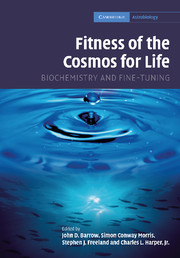Book contents
- Frontmatter
- Contents
- List of contributors
- Foreword: The improbability of life
- Preface
- Acknowledgments
- Part I The fitness of “fitness”: Henderson in context
- 1 Locating “fitness” and L. J. Henderson
- 2 Revisiting The Fitness of the Environment
- 3 Is fine-tuning remarkable?
- 4 Complexity in context: the metaphysical implications of evolutionary theory
- 5 Tuning fine-tuning
- Part II The fitness of the cosmic environment
- Part III The fitness of the terrestrial environment
- Part IV The fitness of the chemical environment
- Index
- References
4 - Complexity in context: the metaphysical implications of evolutionary theory
Published online by Cambridge University Press: 18 December 2009
- Frontmatter
- Contents
- List of contributors
- Foreword: The improbability of life
- Preface
- Acknowledgments
- Part I The fitness of “fitness”: Henderson in context
- 1 Locating “fitness” and L. J. Henderson
- 2 Revisiting The Fitness of the Environment
- 3 Is fine-tuning remarkable?
- 4 Complexity in context: the metaphysical implications of evolutionary theory
- 5 Tuning fine-tuning
- Part II The fitness of the cosmic environment
- Part III The fitness of the terrestrial environment
- Part IV The fitness of the chemical environment
- Index
- References
Summary
It would be a poor thing to be an atom in a universe without physicists. And physicists are made of atoms. A physicist is the atom's way of knowing about atoms.
– George Wald, Introduction to Lawrence Henderson's The Fitness of the EnvironmentA conscious fruit fly would have to confront exactly the same difficulties, the same kind of insoluble problems, as man…. To defy heredity is to defy billions of years, to defy the first cell.
– E. M. Cioran, The Trouble with Being BornWe keep forgetting to go right down to the foundations. We don't put our question marks down deep enough…. What a Copernicus or a Darwin really achieved was not the discovery of a true theory but of a fertile new point of view…. A curious analogy could be based on the fact that even the hugest telescope has to have an eye-piece no larger than the human eye.
– Ludwig Wittgenstein, Culture and ValueScience is the midwife of metaphysics. However much it might protest that it confines itself to physical realities only, science cannot help but provoke metaphysical questions in the human mind. To be sure, when it confines itself to its own specialized sphere, each science is strictly physical, physical both in the scope of its investigation and in the results and data those investigations produce. But science's ultimate import is always metaphysical.
- Type
- Chapter
- Information
- Fitness of the Cosmos for LifeBiochemistry and Fine-Tuning, pp. 49 - 69Publisher: Cambridge University PressPrint publication year: 2007

